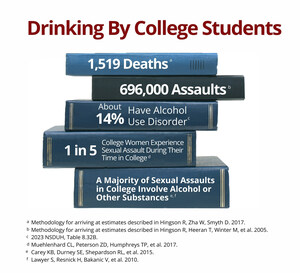The Truth About Holiday Spirits: How to Celebrate Safely This Season
News provided by
National Institute on Alcohol Abuse and Alcoholism, National Institutes of HealthDec 22, 2014, 10:53 ET
BETHESDA, Md., Dec. 22, 2014 /PRNewswire/ -- National Institute on Alcohol Abuse and Alcoholism, National Institutes of Health -- We all want to celebrate during the holidays, and more people are likely to drink beyond their limits during this season than at other times of the year. Some of them will suffer consequences that range from fights to falls to traffic crashes. Sadly, we often put ourselves and others at risk because we don't understand how alcohol affects us during an evening of celebratory drinking.
Myths Persist
Despite these potential dangers, myths persist that, for some, can prove fatal. Scientific studies supported by the National Institute on Alcohol Abuse and Alcoholism provide important information that challenges these widespread, yet incorrect, beliefs about how quickly alcohol affects the body and how long the effects of drinking last.
Alcohol's Effects Begin Quickly
Holiday revelers may not recognize that critical decision-making abilities and driving-related skills are already diminished long before a person shows physical signs of intoxication.
Initially, alcohol acts as a stimulant, and people who drink may feel upbeat and excited. But don't be fooled. Alcohol soon affects inhibitions and judgment, and can lead to reckless decisions.
As we consume more alcohol, reaction time suffers and behavior becomes poorly controlled and sometimes even aggressive—leading to fights and other types of violence. Continued drinking causes the slurred speech and loss of balance that we typically associate with being drunk. At higher levels, alcohol acts as a depressant, which causes the drinker to become sleepy and in some cases pass out. At these levels, alcohol can also cause blackouts or periods of amnesia where a person does not remember what happened while he or she was intoxicated. The intoxicated person actively engages in behaviors like walking and talking, but does not create memories for these or other events that occur during the blackout. In the most extreme cases, drinkers face the danger of life-threatening alcohol poisoning due to the suppression of vital life functions.
Even When Drinking Stops—Alcohol's Effects Do Not
During an evening of drinking, it's also easy to misjudge how long alcohol's effects last. For example, many people believe that they will begin to sober up—and drive safely—once they stop drinking and have a cup of coffee. The truth is that alcohol continues to affect the brain and body long after the last drink has been finished. Even after someone stops drinking, alcohol in the stomach and intestine continues to enter the bloodstream, impairing judgment and coordination for hours.
Before You Celebrate—Plan Ahead
Of course, we don't intend to harm anyone when we celebrate during the holiday season. Yet violence and traffic fatalities persist and myths about drinking live on—even though scientific studies have documented how alcohol affects the brain and body. Because individuals are so different, it is difficult to give specific advice about drinking. But certain facts are clear—there's no way to speed up the brain's recovery from alcohol and no way to make good decisions when you are drinking too much, too fast.
So this holiday season, do not underestimate the effects of alcohol. Don't believe you can beat them, or they may beat you.
Here are some tips to keep in mind if you choose to drink:
- Pace yourself. Know what constitutes a standard drink and have no more than one per hour.
- Have "drink spacers"—make every other drink a nonalcoholic one.
- Make plans to get home safely. Remember that a designated driver is someone who hasn't had any alcohol, not simply the person in your group who drank the least.
Sobering Up––Myths and Facts
Myth: You can drive as long as you are not slurring your words or acting erratically.
Fact: The coordination needed for driving is compromised long before the signs of intoxication are visible. Plus, the sedative effects of alcohol increase the risk of nodding off or losing attention behind the wheel.
Myth: Drink coffee. Caffeine will sober you up.
Fact: Caffeine may help with drowsiness, but not with the effects of alcohol on decision-making or coordination. The body needs time to metabolize (break down) alcohol and then to return to normal. There are no quick cures—only time will help.
Have a safe holiday season!
For more information on celebrating your holidays safely and tips for cutting back, visit: http://www.niaaa.nih.gov/alcohol-health
Photo - http://photos.prnewswire.com/prnh/20141222/165782-INFO
To view the original version on PR Newswire, visit:http://www.prnewswire.com/news-releases/the-truth-about-holiday-spirits-how-to-celebrate-safely-this-season-300013129.html
SOURCE National Institute on Alcohol Abuse and Alcoholism, National Institutes of Health
Related Links
WANT YOUR COMPANY'S NEWS FEATURED ON PRNEWSWIRE.COM?
Newsrooms &
Influencers
Digital Media
Outlets
Journalists
Opted In






Share this article